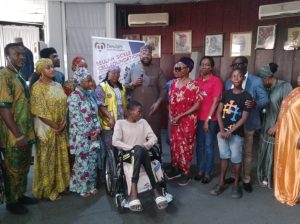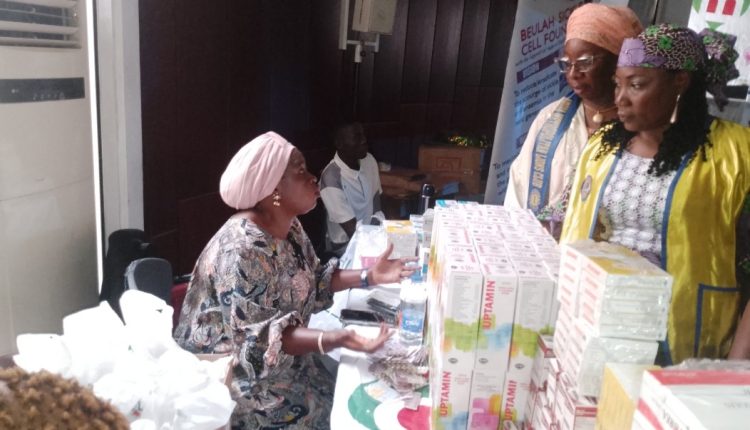A Non governmental Organization (NGO), Beulah Sickle Cell Foundation has urged intended couples to know their genotype before going to marriage to Prevent Sickle Cell Disease.
READ ALSO: Katsina Governor’s wife provides free drugs to sickle cell patients
The founder Beulah Sickle Cell Foundation, Mrs. Josephine Olunake made the call during the five-year celebration of the foundation’s free clinic, in Abuja the nations capital.
Mrs. Olunake highlighted the crucial need for couples to be aware of their genotypes before marriage.

“This awareness is vital in preventing the transmission of sickle cell disease, a genetic disorder that affects many lives in Nigeria.”
Mrs. Olunake, who has been a warrior herself, has dedicated her life to this cause, aiming to dispel the notion that sickle cell disease is a death sentence.
She shared her personal journey with the attendees, revealing that despite being told she would not live beyond the age of 20, she has thrived and even given birth to three children without complications.
Her story serves as a testament to the fact that with proper care and lifestyle adjustments, individuals with sickle cell disease can lead fulfilling lives.

She emphasized that informed decisions about marriage and childbearing are crucial in mitigating the spread of this genetic disorder.
“Beulah Sickle Cell Foundation, established in 2019, has made significant strides in providing free medications and healthcare services to those affected by sickle cell disease.
“Our aim is to ensure that no one suffers due to a lack of access to necessary medications.
“The foundation offers routine medications, antibiotics, and specialized drugs like hydroxyurea and Imatinib, all free of charge. This initiative has greatly improved the quality of life for many individuals, reducing the financial burden on families.
“In addition to providing medications, the foundation also supplies non-consumable items such as bandages and gauze for patients with leg ulcers, a common complication of sickle cell disease,” she added.
Mrs. Olunake pointed out that access to these essential supplies can significantly enhance the quality of life for those affected.
“The foundation’s efforts have proven that proper care and lifestyle changes can lead to better health outcomes and increased life expectancy for sickle cell patients.
“The free clinic, held monthly, attracts a large number of participants, with over 90 people attending each session. This high turnout is a testament to the trust and reliance the community places in the foundation’s services,” she added.
Mrs. Olunake explained that the clinic not only provides medical care but also serves as an educational platform.
“Experts in various fields, including hematologists, plastic surgeons, and cardiologists, are invited to speak and offer guidance on managing the condition.
“A significant part of the foundation’s mission is to educate the public about the realities of sickle cell disease.”
Mrs. Olunake emphasized that sickle cell disease should not be seen as a death sentence but rather as a manageable condition.
By spreading awareness and advocating for genotype testing before marriage, the foundation aims to reduce the incidence of sickle cell disease and improve the lives of those affected.
“We must take informed decisions, not selfish ones, to prevent our children from suffering.
“Stigmatization of individuals with sickle cell disease remains a significant challenge.”

Mrs. Olunake stressed the importance of self-love and education in combating this stigma, “Understanding and accepting your condition is the first step towards living a fulfilling life,” she said.
In a heartfelt address, a representative from Towers of Strength, (IHS), Asmal Ismaila, paid tribute to the unwavering spirit of individuals battling sickle cell disease.
She acknowledged the critical support systems comprising family, friends, medical professionals, and funders who tirelessly dedicate themselves to providing care and advocacy. Emphasizing the importance of their love and compassion.
Ismaila highlighted that their efforts are vital in the ongoing fight against this debilitating illness.
She noted that their contributions are pivotal in fostering hope for a brighter future. “Together, we can make a difference. Together, we can celebrate the fighters, the caregivers, and the supporters.
Despite the prevailing macroeconomic challenges, Ismaila reaffirmed IHS’s commitment to the cause by announcing a 3 million naira donation to the Beulah Sickle Cell Foundation.
“This significant contribution underscores IHS’s determination to support those affected by sickle cell disease and enhance research and awareness initiatives.”

